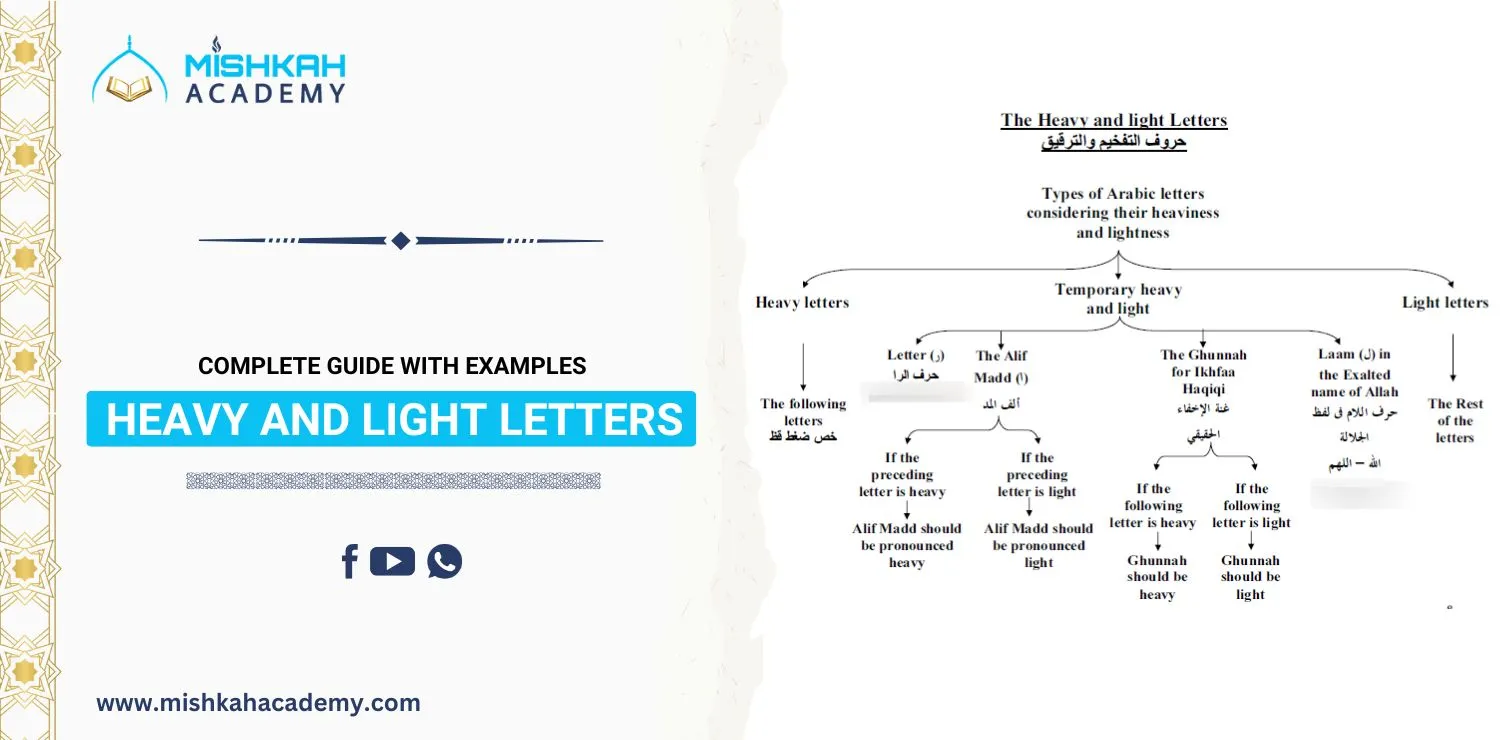The principles guiding the correct pronunciation of the Quran’s characters are known as Tajweed (تجويد) in Arabic. Derived from the Arabic root term ‘j-w-d’, meaning ‘to make anything better,’ Tajweed basically makes the Quranic recitation more beautiful and enhanced. When used properly, Tajweed guarantees that every letter is pronounced accurately, preserving the Quran’s original meaning.
Understanding and correctly pronouncing Heavy and Light Letters is a crucial part of Tajweed rules. Having proficiency in these letters has a big impact on the caliber of recitation and extent of one’s understanding of the Quran word by word.
Heavy And Light Letters
Table of Contents
ToggleUnderstanding Heavy and Light Letters (الاستعلاء والاستفال) is fundamental for mastering Arabic pronunciation, especially when reading the Quran. These concepts form an essential part of Tajweed, ensuring that Quranic recitation is beautiful and accurate. In this article, we will explore the meaning, importance, and rules of “Heavy and Light Letters in Tajweed & Arabic“, along with examples to help you better understand these key elements of Quranic recitation.
Heavy Letters (Mufakhkham Letters) / حروف التفخيم)
Pronouncing heavy letters needs a thicker mouth sound. The back portion of the tongue rises toward the roof of the mouth, creating a deep resonance that gives the sound its weight or fullness. The tone becomes strong and rounded as a result. We refer to these letters as “Mufakhkham” letters.
The Seven Heavy Letters (حروف التفخيم)
The heavy letters are commonly remembered through the mnemonic “خُصَّ ضَغْطٍ قِظْ” (Khuss DaGhTin QiDh). The letters are:
- خ (khaa’)
- ص (Saad)
- ض (Daad)
- غ (Ghain)
- ط (Taa’)
- ق (Qaaf)
- ظ (Dhaa’)
Light Letters (Muraqqaq Letters) / حروف الترقيق)
The sound of light letters is softer and thinner. This happens when there is neither rounding nor fullness in the mouth, nor does the rear of the tongue rise. “Muraqqaq” letters are the name given to these letters.
Letters that are neutral
Letters aren’t always weighty or light. Depending on certain conditions, some letters can alter their state. These consist of:
- ل (Laam) in Allah: Heavy only when preceded by a Fatha or Dammah and light when preceded by a Kasrah.
- ر (Raa’): This letter can be heavy or light depending on its surrounding vowels and context.
The Rules for Pronouncing Heavy and Light Letters
Guidelines for Weighty Letters
Whatever the vowel, the seven heavy letters (Fatha, Kasrah, Dammah) are always pronounced with heaviness. The rule is simple: the reciter must automatically use the Tafkheem principles whenever one of these letters appears in the recitation.
Guidelines for Light Letters
Light is the natural pronunciation of the majority of the remaining Arabic letters. However, a letter may be pronounced heavily in specific conditions. The weight of a letter may change, for instance, when a heavy letter follows a light letter or when a particular context emerges during recitation.
Practice is essential to internalize these rules of “Tafkheem and Tarqeeq”, for perfect recitation with proper Tajweed Rules to learn To Recite Quran Beautifully. Enroll in advance tajweed course to learn heavy and lighter letters properly with expert quran tutors.
Start Your Tajweed Journey Today
Rules for Neutral Letters: Laam and Raa’
- Laam (ل): This letter is normally light, but it becomes heavy when it is part of the word “Allah” and preceded by a Fatha or a Dammah. However, if it is preceded by a Kasrah, it remains light.
For example:
In اللَّهُ (Allah), the Laam is heavy due to the preceding Fatha (َ).
In بِاللَّهِ (Billahi), the Laam remains light due to the preceding Kasrah (ِ).
- Raa’ (ر): This letter can either be heavy or light based on certain conditions:
Heavy when:
- It has a Fatha or Dammah.
- It is silent and preceded by a Fatha or Dammah.
Light when:
- It has a Kasrah.
- It is silent and preceded by a Kasrah.
For example:
In رَبِّي (Rabbi), the Raa’ is light due to the Kasrah (ِ).
In رَحْمَة (Rahmah), the Raa’ is heavy due to the Fatha (َ).
Heavy and Light Letters in Arabic
In Arabic, only seven letters are always heavy, while others remain light unless affected by certain rules. Here are the key details:
- Heavy Letters (استعلاء):
– These are: خ، ص، ض، غ، ط، ق، ظ
– They produce a deep sound by elevating the back of the tongue towards the soft palate. - Light Letters (استفال):
– Most Arabic letters are light, such as ب، ت، د، ر (in some cases), س، ش.
– These letters are pronounced with a natural tone, without elevating the tongue.
The Unique Case of the Letter ر (Ra)
- The letter “ر” can be either heavy or light depending on its position in a word:
– Heavy: When it is preceded by a fatha (ـَ) or dammah (ـُ), such as in رَحمن (Rahman) or رُسل (Rusul).
– Light: When it is preceded by a kasrah (ـِ), such as in فرِيق (Fareeq).
Heavy and Light Letters Examples
Here are some Quranic examples to illustrate the correct pronunciation of heavy and light letters:
-
Example of Heavy Letter – ط:
- “اهدنا الصراط المستقيم” (Al-Fatiha: 6)
- The “ط” in “صراط” must be pronounced heavily, giving a full, rich sound.
-
Example of Light Letter – ت:
- “قد أفلح المؤمنون” (Al-Mu’minun: 1)
- The “ت” in “قد” is pronounced lightly with no pressure on the tongue.
-
Mixed Letters:
- “فرعون” (Pharaoh)
- The “ر” is heavy due to the fatha before it, while the “ف” is light.
Understanding these nuances enables smooth transitions between letters while preserving the melody and meaning of the verses.
Benefits of Learning Heavy and Light Letters in Tajweed
There are several advantages to learning how to pronounce heavy and light characters correctly in Tajweed:
- Proper Reading of the Quran: Words in the Quran may lose meaning if they are mispronounced. Pronouncing ص (heavy) as س (light), for instance, can alter the meaning of the entire word. Thus, the precision of Quranic recitation is maintained by understanding heavy and light letters.
- Beautification of Recitation: Proper pronunciation of heavy and light letters gives the quran recitation a rhythm and beauty. The listener is drawn in by this rhythm, which also adds balance to the recitation.
- Spiritual Impact: Pronouncing the words correctly when reciting the Quran strengthens one’s spiritual bond with it. The softness of light characters like ت and س and the deep, resonant sound of heavier letters like ق and ض arouse distinct emotions in the listener and reciter, affecting their hearts and souls.
- Enhances Quranic Memorization: By learnibyng Tajweed norms such as heavy and light letters, students who want to memorize the Quran will be able to understand the text more clearly and find it simpler to commit to memory.
Practical Tips for Mastering Heavy and Light Letters
- Hear Skilled Reciters: Hearing proficient reciters aids in internalizing the proper way to pronounce heavy and light letters. Keep an eye on how they pronounce heavier letters like ق and ض in contrast to softer ones like ν and ت.
- Practice with a Teacher: It’s crucial to sign up for an online Tajweed course or ask a qualified teacher for advice. They can offer specific advice and assist in fixing errors.
- Recite aloud: By practicing out loud, you may better discern between heavy and light sounds by feeling where your mouth and tongue are.
- Use Mnemonics: “Khuss DaGhTin QiDh” is a useful mnemonic for memorizing large letters. Reading these letters again will help you remember their qualities.
Common Errors to Avoid
- Beginners sometimes mix up similar-looking letters, such ص (heavy) and س (light). Avoiding this error can be facilitated by regular practice with an instructor.
- Avoiding Context-Based Changes in Raa’ Pronunciation: Raa’ rules require paying close attention to the surrounding vowels. Depending on whether a Fatha, Kasrah, or Dammah comes before it, make sure the Raa’ is heavy or light.
- Failure to Stick to Laam Laws in “Allah”: When “Allah” is pronounced with a Fatha or Dammah before the Laam, it should be pronounced heavily. Ignoring this guideline may result in incorrect recitation.
Conclusion
Mastering the rules of heavy and light letters is essential for anyone seeking to improve their Quran Recitation. With the right guidance and consistent practice, learners can perfect their Tajweed and recite the Quran with beauty, accuracy, and confidence. Join Mishkah Academy Quran Recitation Course with Tajweed today and take the first step toward mastering Quran Recitation!






